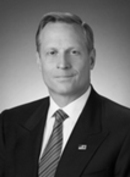The following is a work of fiction.
It is the third in a series of sci-fi novels of the type known as
alternate history. What’s different is that this series takes place in
our time, with characters familiar in your real life.
The first book in the series, The Chinese Century, was written late 2004. Its table of contents is here. The second, The American Diaspora, was written in 2005. Its table of contents for that book is here.
“You’re sure I can’t talk you into moving here permanently?”
Ross Perot Jr. shook his h
ead. “You couldn’t budge my dad with an outright confiscation law,” he said. “But we’re a worldwide company, and proud to have this contract. It has been a complex integration task…”
Cheney held up his hand. “Outside my pay grade, I’m afraid. As long as your technical people please my technical people, I’m good. And I’m proud to see how well you’ve done.”
After they shook hands, and Perot left his office, Cheney swung his chair around slightly, pressed a button to de-polarize the glass of his office wall, and looked out over his trading floor. In front of him a sea of cubicles, with waist-high walls between them, were filled by men in shirtsleeves and neatly-clipped black beards.
No women. No blacks. No queers, and he had the full power to check. Just Arabic, European and a few good American men, a state of the art computing system, and enough fiber backbone to make everything instantaneous.
The word had gone forth, quietly, to major hedge funds and other financial players around the world. The gist was that the new Dubai Central Market would beat any price for trading any instrument or commodity. Stocks, bonds, currency, re-insurance, futures, you name it. And no trail beyond what is necessary to complete the trade, no taxes, pure unadulterated worldwide capitalism.
His reverie was interrupted by a tone, coming from the computer terminal on his desk. He pushed the mouse and the screen lit up, a text message and a picture of the man sending it.
Jack Goldstein had been number two in the bond trading department at Morgan Stanley until a month ago. His bonus the previous year totaled $45 million. Sounds great, but like any top trader he believed he could do better. Now, as shift head of the DCM trading floor, he aimed to prove it. He would be leaving work shortly before his former colleagues in New York arrived at their desks, but he also knew in his gut that they weren’t the people he should be worrying about.
“Soros wants to trade dollars for yen, at two basis points below the current Tokyo strike price,” the message read.
Cheney mashed the mouse again, activating a voice interface Perot Systems had installed. “How much?” He saw the words display on his screen.
The message came back. “1 billion.”
“Chickenfeed,” said Cheney. “Do it.” DCM would place some of its own capital at risk in the trade, but if Soros was happy with the service, and the trade caused markets to move as he wished them to, he’d be coming back. And so would others.
Imagine. A secret off-line market that could move, even control, other markets. Membership strictly limited to those with the chips to play there. “Open dollar yen,” said Cheney, watching the ticks as the Tokyo market traded in the wake of Soros’ trade. From 117, he saw it move to 116, an enormous improvement from the price he’d just given. “Goldstein, flip it,” he said to the terminal. The IM sounded. “Already done.”
Cheney felt his palms sweat. A 98 basis point profit on a $1 billion investment in yen comes to…”$10.5 million,” the IM said. “Plus change.”
Soros had his yen, Cheney had his dollars, the connection had been made, and DCM was $10 million richer in the bargain.
“It’s not always going to work that way,” the IM reminded him. “I know,” Cheney grunted, which came out on the screen as “no.” “I mean, I know,” he said, a bit louder.
“Goldstein out.” The screen went dark a moment, then a second window opened in front of him, a calendaring window.
“Erik Prince, 11:30,” the calendaring program said.
“Excellent,” said Cheney. He levered himself up from his chair and headed to his private dining room, where an important meeting would be held.
Slowly, the wall re-polarized, the view of his trading floor fading into black.











